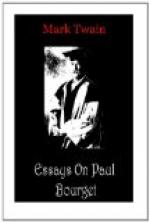Why, I even doubt if it is you who furnish me all that excellent information about Balzac and those others.—["Now the style of M. Bourget and many other French writers is apparently a closed letter to Mark Twain; but let us leave that alone. Has he read Erckmann-Chatrian, Victor Hugo, Lamartine, Edmond About, Cherbuliez, Renan? Has he read Gustave Droz’s ‘Monsieur, Madame, et Bebe’, and those books which leave for a long time a perfume about you? Has he read the novels of Alexandre Dumas, Eugene Sue, George Sand, and Balzac? Has he read Victor Hugo’s ‘Les Miserables’ and ‘Notre Dame de Paris’? Has he read or heard the plays of Sandeau, Augier, Dumas, and Sardou, the works of those Titans of modern literature, whose names will be household words all over the world for hundreds of years to come? He has read La Terre—this kind-hearted, refined humorist! When Mark Twain visits a garden does he smell the violets, the roses, the jasmine, or the honeysuckle? No, he goes in the far-away corner where the soil is prepared. Hear what he says: ’I wish M. Paul Bourget had read more of our novels before he came. It is the only way to thoroughly understand a people. When I found I was coming to Paris I read La Terre.’"]—All this in simple justice to you—and to me; for, to gravely accept those interlardings as yours would be to wrong your head and heart, and at the same time convict myself of being equipped with a vacancy where my penetration ought to be lodged.
And now finally I must uncover the secret pain, the wee sore from which the Reply grew—the anecdote which closed my recent article—and consider how it is that this pimple has spread to these cancerous dimensions. If any but you had dictated the Reply, M. Bourget, I would know that that anecdote was twisted around and its intention magnified some hundreds of times, in order that it might be used as a pretext to creep in the back way. But I accuse you of nothing—nothing but error. When you say that I “retort by calling France a nation of bastards,” it is an error. And not a small one, but a large one. I made no such remark, nor anything resembling it. Moreover, the magazine would not have allowed me to use so gross a word as that.
You told an anecdote. A funny one—I admit that. It hit a foible of our American aristocracy, and it stung me—I admit that; it stung me sharply. It was like this: You found some ancient portraits of French kings in the gallery of one of our aristocracy, and you said:
“He has the Grand Monarch, but where is the portrait of his grandfather?” That is, the American aristocrat’s grandfather.
Now that hits only a few of us, I grant—just the upper crust only—but it hits exceedingly hard.
I wondered if there was any way of getting back at you. In one of your chapters I found this chance:
“In our high Parisian existence, for instance, we find applied to arts and luxury, and to debauchery, all the powers and all the weaknesses of the French soul.”




